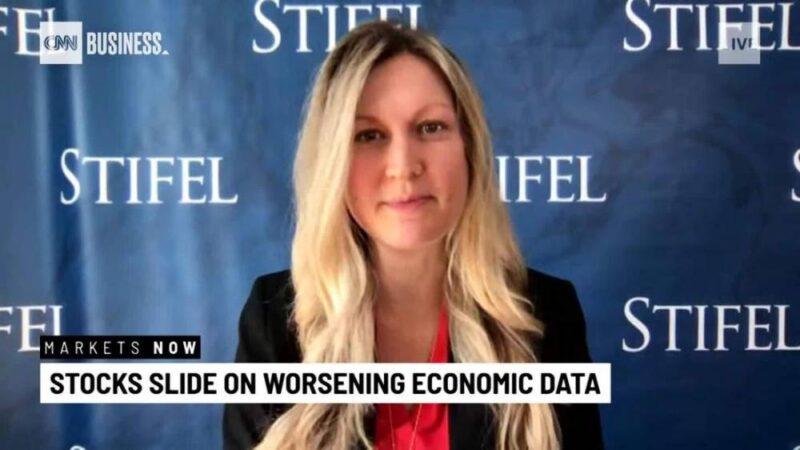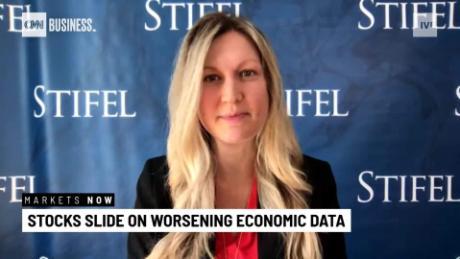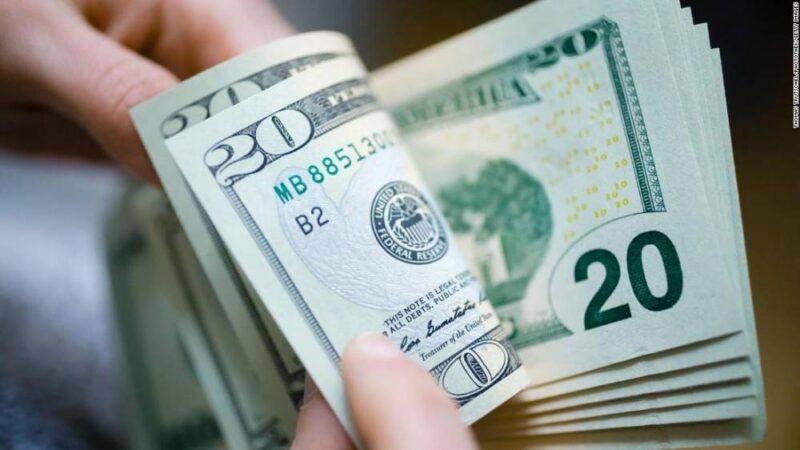New York (CNN Business)Market volatility has reached epic heights in the past few weeks, so it’s tempting for investors to throw up their hands. Why not just ditch stocks and put money into cash in order to avoid big drops?
That would probably be a mistake. Long-term investors need to ride out the inevitable bear markets — as painful as they may be. That was the case in 2008. And 2000. And all previous bear markets before that.
Rather than pulling money out of stocks during times of intense market drama, investors should buy the proverbial dips and increase their market exposure after particularly bad days on Wall Street.”What if investors, instead of fleeing to cash during the tumultuous times, instead invested more money following each of the worst days in the market?” asked Brian Levitt, global market strategist for North America at Invesco.Read MoreLevitt wrote in a blog post last week about two hypothetical investors that both invested $100,000 in stocks in 1995. One simply held tight while the other added $5,000 after each of the 20 worst days for the market.

Tiger King + coronavirus = Huge win for Netflix's stockThe investor that bought on the dips would have had $300,000 more (and over $1 million total) by the end of 2019 than the one who never bought more stocks. It’s worth noting that even the investor who did nothing would still have more than $700,000 in their portfolio — which proves that there is wisdom in staying invested and not panicking. But getting out of stocks entirely and rushing into cash is an even bigger investing blunder. Levitt noted that 13 of the 20 biggest daily market gains took place during the 2008-2009 bear market.
Fear of a bear market means you may miss the bull
That means investors missed out on those rallies if they got out of stocks and went into cash or money market funds. Levitt dubbed this as an example of “investors making imperfect decisions at inopportune times.””The next weeks will likely bring more uncertainty and persistent volatility in markets,” he added. “History reminds us that being in the markets for the best days, and even adding to portfolios following the worst days, has been the better approach.”


JUST WATCHED
Economist: Depression can be avoided if US reopens in May
ReplayMore Videos …MUST WATCH
Economist: Depression can be avoided if US reopens in May 02:20As awful as things may seem right now for the global economy, investors have to hold on to hope that conditions will eventually improve. “Don’t look at the shaky ground we currently stand on,” said Tom Lee, chief investment officer of equities and derivatives at Pandemic, in a report Monday. “Instead, look out three to five years.” “If the events surrounding the pandemic have changed that longer-term view, then — and only then — should you consider making modifications to your portfolio,” Lee added. “Making significant modifications in reaction to short-term market volatility is no recipe for success.”But investors will need to be patient. Stocks probably won’t bounce back quickly from the devastating effects of the Covid-19 pandemic. Coronavirus has already claimed thousands of lives and millions of jobs.
Recovery may take awhile but it will happen
In past bear markets, it has taken an average of more than three years (39 months) for stocks to hit new highs following a previous bull market peak, according to UBS Global Wealth Management chief investment officer Mark Haefele. But Haefele pointed out that the many economic stimulus measures that the Federal Reserve and Congress/the White House (as well as global leaders) have already put into place to help struggling consumers and businesses may lead to a more rapid recovery.

The US dollar is still king during the coronavirus”There is plenty of reason to stay invested, given the unprecedented speed and scale of the support measures announced by governments and central banks,” Haefele said in a report Monday.Haefele added that it wouldn’t be wise to wait for the market to return to its lows from a few weeks ago before buying back into stocks.
“The recent rise in stocks might leave some investors waiting for a renewed decline before investing, given the uncertainties from the crisis. This approach runs the risk of sitting on the sidelines for a prolonged period before potentially buying in at a higher level,” Haefele said. In other words, it’s better to keep money in the markets and ride out the storm instead of waiting for an even bigger dip that may never materialize.
Source: edition.cnn.com

